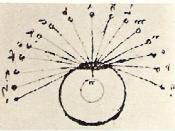Probably one of the most dramatic changes which has taken place in the way that human beings communicate is the advent of the high-tech, digital communication media which have dominated the last decades of the twentieth century and the beginning of the twenty-first. As Birkerts (1994, pp.104-112) points out, the influence of telecommunications in the modern age is analogous to the development of rail transport in the industrial revolution: not only a means of transforming methods of contact between one geographical region and another, but also a way in which an entire ideological structure could be extended, in the form of a far-reaching network, on a massive scale. In much the same way as the railways enabled the growth of capitalism, so the new communications media offer an opportunity for national and transnational conglomerates to "establish global empires" (Birkerts, 1994, p.125).
However, as Birkerts also notes, it would be overly simplistic to assert that the older forms of communication, such as the print media, are being abandoned wholesale in favour of the new.
Rather, western society is in the throes of a transition which carries with it its own ideological baggage, distinct from both that of the old and of the new. An example familiar to most is the change in the way that news is disseminated: despite the prevalence of online versions of most major newspapers, print copies are still produced and still maintain sizable circulations. Similarly, although round-the-clock satellite news channels are increasing in popularity, there has been no significant decline in the viewing figures for the more intellectual and analytical news programmes, in which soundbites and instant updates give way to detailed and thoughtful analysis of current situations in context.
One might account for the continuing prevalence of print on pragmatic grounds: it is easier to carry...


